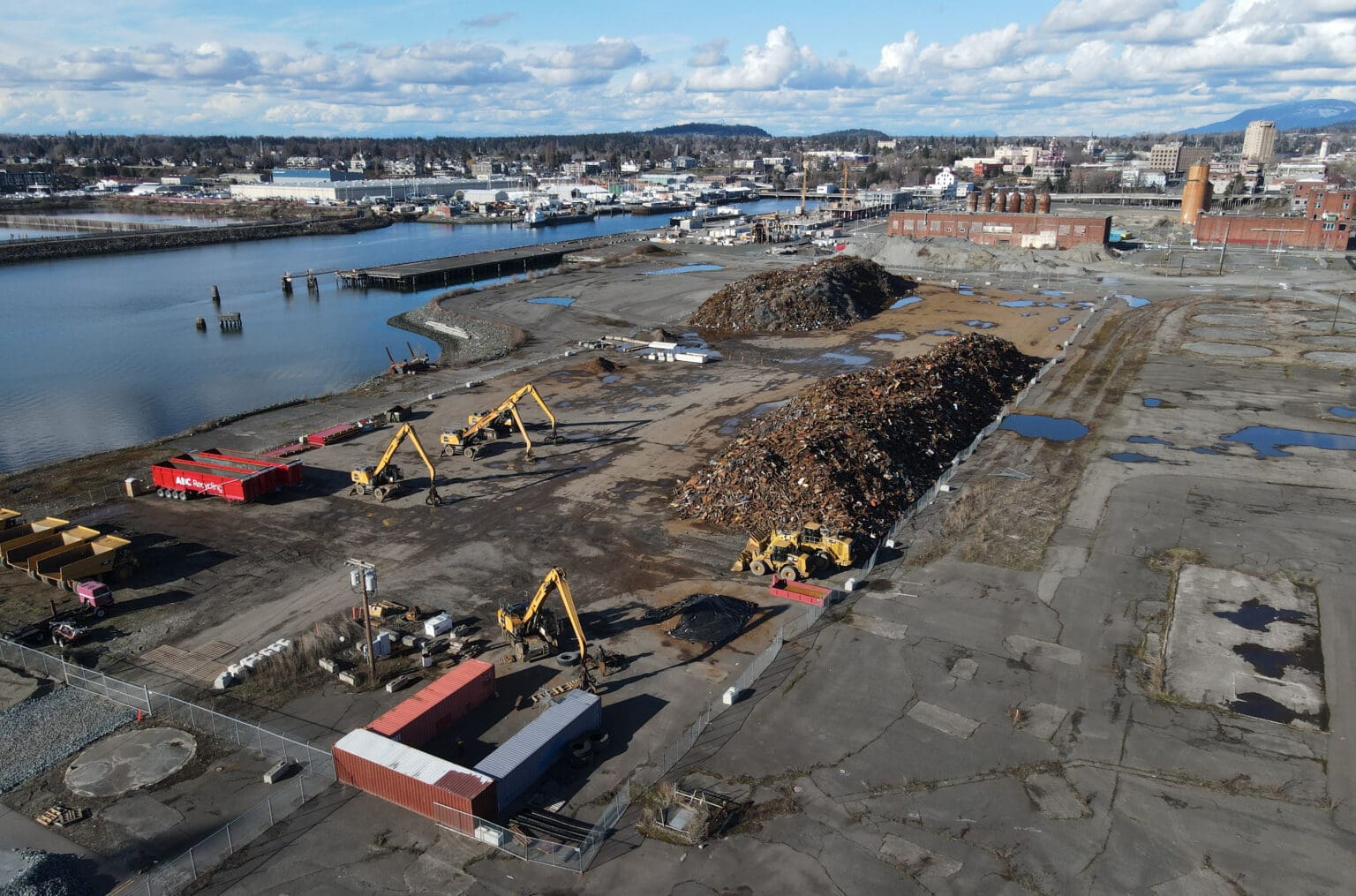People on both sides of the debate about a metal recycling business in Bellingham might agree on one thing.
It feels like Cherry Point all over again.
Over the past 15 years at least, Whatcom County’s industrial zone along the Salish Sea has been the subject of a turf war between labor leaders and others who insist the county should be a home to heavy industry, and residents calling for a relatively pristine playground for families, retirees and wildlife.
Among those who live and work in Bellingham, the debate shifted closer to home after ABC Recycling began storing and shipping scrap metal at the city’s waterfront in June 2022.
Critics see the Canada-based company conducting a two-pronged incursion into the city: the noisy shipping operation, and now a proposed metal-shredding facility on industrial land in Alderwood.
Bellingham mayoral candidate Kim Lund invoked Cherry Point at a recent forum when she likened ABC Recycling to an ill-fated proposal to build North America’s largest coal export terminal in that part of the county, which at the time already included an aluminum smelter and two oil refineries.
“To me, it has shades of the Gateway Pacific Terminal right now, in what is going through our community,” Lund told a Bellingham City Club audience Sept. 27, in response to a question about ABC Recycling.

When union organizers found out about a proposed moratorium that would temporarily halt new development in heavy-industry zones in Alderwood, they were reminded of Cherry Point, too. Karl de Jong, president of the Northwest Washington Central Labor Council, feared another moratorium amounted to a “Cherry Point 2.0,” recalling a moratorium on new fossil-fuel operations in that area that lasted from 2016 to 2021.
“There’s a trigger word for us, and that’s ‘moratorium,’” de Jong said at an Oct. 18 labor council meeting. “Because in 2016, we really got burned on that.”
Council inaction
The Alderwood proposal could prompt an even more visceral argument. Unlike Cherry Point, the proposed facility butts directly against established residential areas.
Two members of the Whatcom County Council tried to put the brakes on the metal shredder, and any other new heavy industries in Alderwood, by calling for a one-year moratorium on development on land in that area zoned “heavy impact industry.” Their proposal failed to win a majority of council votes at the Tuesday, Oct. 24 council meeting.
The moratorium vote fell along the county council’s well-worn political lines, with conservatives Tyler Byrd, Ben Elenbaas and Kathy Kershner opposed to the measure, while more progressive members Barry Buchanan, Todd Donovan and Carol Frazey supported it.
Council member Kaylee Galloway effectively decided the matter by abstaining from the vote. Galloway said she had held 15 meetings over the prior four weeks with various stakeholders on the issue, and counted more than 100 emails from concerned members of the public.
“I live downtown, within a quarter to a half mile of the [waterfront] operation, so I understand firsthand the concerns about quality of life and noise and traffic, and everything that comes with that,” Galloway said after the meeting. “But I also believe in a working waterfront.”
At the labor council meeting, Galloway said something union members liked hearing: She supported no net loss of heavy-industry zoning in the county.
“I never want to see an end of industry in Whatcom County,” Galloway said.
Not so green

Some speakers at Tuesday’s county council meeting were concerned about industry’s proximity to residential neighborhoods.
“My husband and I moved to this city because we love how environmentally friendly it is, and how accessible the outdoors are. And we want to have and raise children here,” Birchwood resident Katie Horvath said during the public hearing.
“This is not about ‘not in my backyard,’” she added. “It’s about ‘not in anyone’s backyard.’ No heavy industrial processing, with pollution and danger and noise, should be allowed close to any residential area, full stop.”
Metal shredders are one aspect of industrial recycling efforts worldwide, but they aren’t always clean and green. A 2021 state of California report on these operations, which typically shred old vehicles and appliances for easier storage and transport, found “numerous examples of accidents, improper storage of hazardous wastes, soil contamination and releases of hazardous wastes.”
Aware of the risks and residents’ concerns, officials at ABC Recycling promise “a modern, state-of-the-art facility that will manage the emissions and noise,” as Riley Sweeney, the company’s community relations manager, put it during the hearing.
The shredder itself will be enclosed inside a building, Sweeney said, and will only operate “during normal business hours.” Preliminary plans for the site indicate the company will keep most of the trees on its 19.7-acre lot on Marine Drive. This should buffer the noise, Sweeney said.
“ABC Recycling plans to be a good neighbor and a good partner to our community,” he said.
Neighbors on South Hill aren’t so sure. ABC Recycling got off on the wrong foot with some of the residents in a swath of neighborhoods, from the Lettered Streets to Fairhaven. They’ve been kept awake until 3 a.m., whenever the company loads scrap metal onto ships for transport overseas.
The most recent ABC vessel departed in late September, and the next one isn’t due for another few months. Through an agreement between ABC Recycling and the longshoremen’s union, crews will stop work at midnight in an effort to appease affected residents.

Scott Jones, a founding member of Save the Waterfront, has a direct line of sight to ABC Recycling’s waterfront operations from his South Hill home. He said his 9-year-old daughter is awakened throughout the night during vessel loading, until she falls asleep from exhaustion.
“It’s very difficult on families,” Jones said. “It’s difficult to get the rest that they desire, that they truly need for their health.”
Port and union officials cautioned the reduction in operating hours will only apply to ABC Recycling jobs.
“That is a significant concession that the port is willing to make, on this cargo and this cargo only,” Port of Bellingham Executive Director Rob Fix told union members at the labor council meeting. “We need to be a 24/7 operation to compete” with other ports in the region, he added.
The Port anticipates about $1.5 million in annual revenue from ABC Recycling.
Pollution concerns
Noise isn’t the only problem at the waterfront. The water around the shipping terminal exceeded acceptable limits for lead, zinc and copper earlier this year, Sweeney said. Since then, ABC has deployed canopies to span the gap between the ship and the dock during loading.
“We’ve loaded four boats, and with each operation, we get a little better at it,” Sweeney said.

The port put other measures in place at the waterfront to minimize pollution from the scrap metal operation. Crews replace filters and clean affected areas more frequently. They also sprayed the metal-storage and loading areas during the drier months, to reduce dust.
The port is currently in compliance with its state stormwater permit, port Public Affairs Administrator Mike Hogan said.
For now, ABC Recycling will continue to conduct business at the waterfront, exercising a lease that expires in 2037. And in the months ahead, company officials anticipate hammering out with county planners the permit requirements for a new metal shredding facility on Marine Drive.
Neighbors in the north Bellingham area and other members of the public will have more opportunities to weigh in on the proposal.
“We’re just getting started,” Jones said. “If the project moves forward, we will work closely with the county and government agencies to make sure that all water, air and noise pollution is mitigated to the fullest extent possible.”



